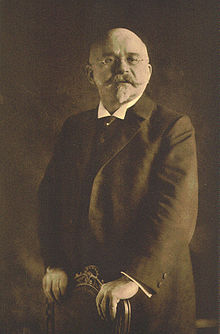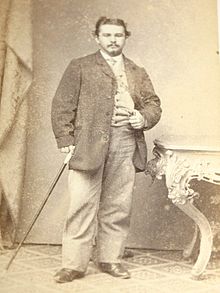Julius Scarlet
Julius Scharlach (born February 12, 1842 in Bodenwerder , † March 18, 1908 in Hamburg ) was a German lawyer and colonial entrepreneur.
Life
Scharlach was the son of a Hamburg merchant, his mother Rosa a née Ehrenberg. After attending the learned school of the Johanneum , he studied law at the University of Göttingen from 1863 and became a member of the Corps Hannovera . After graduating as Dr. iur. he settled as a lawyer in Hamburg and initially founded a partnership with Theodor Braband . At the Franco-German War scarlet participated as a volunteer. In 1872 he joined the lawyers Ludwig Ferdinand Noak and Julius Ludwig Seebom. Scarlet fever became one of the most important private persons in the German colonial history of the Wilhelmine Empire and developed considerable corresponding activities. He was the founder and chairman of the Hanseatic Colonization Society, member of the board of the fleet association , president of the church council of the evangelical-reformed community and member of the board of the German colonial council . Scharlach was one of the founders of the colonial school in Witzenhausen .
In the course of the colonization of the Germans in Brazil, in which he was involved, a river near Blumenau was named after him.
As a lawyer he was the defender of the dismissed governor of German East Africa Carl Peters . His mandate as in-house counsel for the noble corporation opened up good contacts in British financial circles for him. Scarlet fever worked closely with Sir Cecil Rhodes from 1905–1908 . The aim of the two was to avoid a military conflict between the German Reich and the United Kingdom. Scharlach was also involved economically in German South West Africa and in Cameroon . He was the founder of the South Cameroon Society , the founder of the South West Africa Company in Hamburg, for which he acquired the Damaraland concession, and the founder of the Otavi Mining and Railway Company .
After his death, his son, the commercial and shipping lawyer Otto Scharlach , continued the Hamburg law firm together with the partners Eduard Wilhelm Westphal , Harald Poelchau and Alexander Lutterroth until 1939; after his return from emigration to Switzerland after the Second World War, he founded a private practice in 1947. His father's law firm later became known as "Stegemann Sieveking Lutteroth" and continues as the Hamburg office of the international law firm Freshfields Bruckhaus Deringer .
Fonts
- In defense of Dr. Carl Peters , Berlin 1898.
literature
- Heinrich Ferdinand Curschmann : Blue Book of the Corps Hannovera to Göttingen. Volume 1 (1809-1899), Göttingen 2002, p. 209, no. 673.
- Ralph Erbar: Julius Scharlach. In: New German Biography (NDB). Volume 22, Duncker & Humblot, Berlin 2005, ISBN 3-428-11203-2 , p. 571 f. ( Digitized version ).
- Scarlet in: German Colonial Lexicon
- Reinhard Pöllath , Ingo Saenger (Eds.): 200 years of business lawyers in Germany , Nomos, Baden-Baden 2009, p. 17, 82 ff. ISBN 978-3-8329-4446-9
- Christiane Fritsche, Britta Stücker, Thomas Prüfer: 175 years of Freshfields Bruckhaus Deringer in Germany , Beck-Verlag, Munich 2015, p. 32 ff.
Individual evidence
- ↑ Gerrit Schmidt: The history of the Hamburg legal profession from 1815 to 1879 Hamburg 1989; P. 364
- ^ Klaus Richter, History of the Effects of German Antitrust Law Before 1914 , p. 101
- ↑ See also the article Eugen Kalmár
| personal data | |
|---|---|
| SURNAME | Scarlet fever, Julius |
| BRIEF DESCRIPTION | Hamburg lawyer and German colonial entrepreneur |
| DATE OF BIRTH | February 12, 1842 |
| PLACE OF BIRTH | Bodenwerder |
| DATE OF DEATH | March 18, 1908 |
| Place of death | Hamburg |


